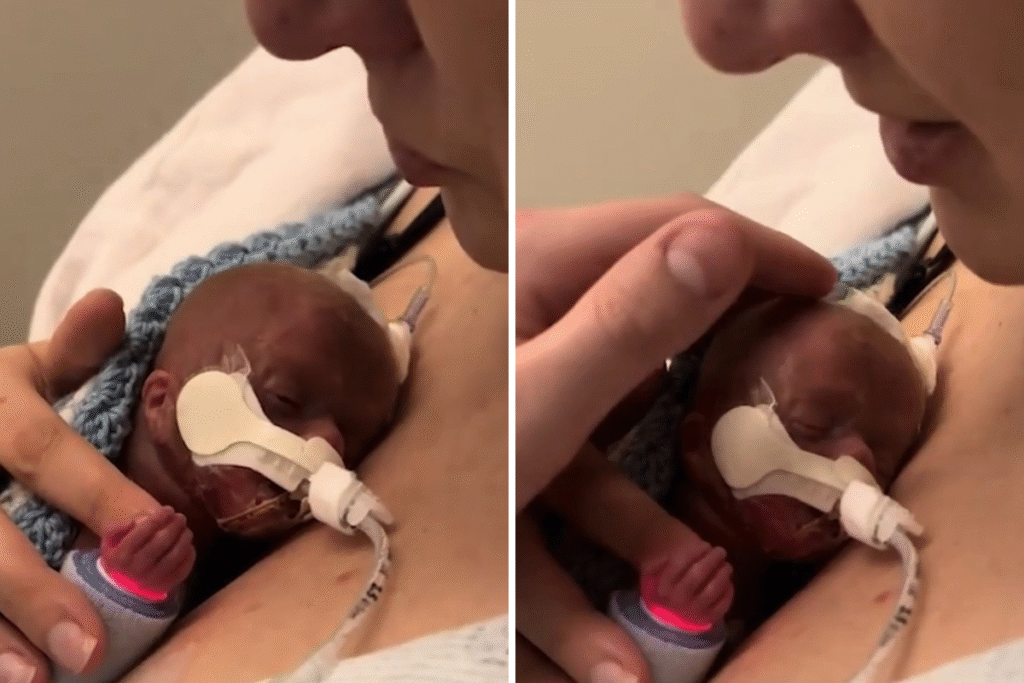When Sydney Files held her son for the first time, it was nothing like she had imagined. Born at just 24 weeks, her baby, Cooper, was so small and fragile that doctors told her there was “nothing else they could do.”
The 27-year-old architectural designer from Orlando, Florida, shared footage of their first cuddle on TikTok (@squidney1117), where it has since been viewed over 2 million times. In the video, text layered over the clip reads that she “thought it would be the first and only time I would hold him.”
Newsweek spoke to Files about her traumatic pregnancy, the terrifying birth, and the miracle that followed—because today, her son Cooper is 15 months old and continuing to defy the odds.
The Odds of Survival for Extremely Premature Babies
According to The March of Dimes, a nonprofit dedicated to improving maternal and infant health, over 69,150 babies are born each week in the United States, and nearly 2,000 of them arrive very preterm—meaning before 32 weeks of gestation.
Infants born before 24 weeks have survival chances below 50 percent, and about 40 percent of those who survive face long-term complications. By 24 weeks, however, the survival rate improves significantly—to between 60 and 70 percent.
‘My Placenta Was Failing’
Files told Newsweek that her pregnancy was smooth until a 16-week prenatal checkup changed everything.
“I received routine bloodwork results that changed everything. My OBGYN called to say that my labs were abnormal and referred me to a maternal-fetal medicine specialist. There, I learned that my placenta was failing; it wasn’t providing the nutrients my baby needed to grow,” she said.
“My doctor warned me that I was at high risk for developing preeclampsia, a dangerous pregnancy complication, and placed me on a high-protein diet and several medications in hopes of slowing its progression.”
At 23 weeks, she was diagnosed with preeclampsia—a condition marked by dangerously high blood pressure—and was ordered to stay on strict bedrest in the hospital until delivery.
“We knew our baby might come early, but nothing could have prepared us for what happened next,” she told Newsweek.
Just a week later, at 24 weeks and four days, during a routine checkup, Cooper’s heart rate began dropping. Files was rushed into an emergency C-section.
On July 15, 2024, at 3:59 p.m., Cooper was born.
“From that moment on, our journey truly began,” she said. “Cooper was immediately intubated and taken to the Neonatal Intensive Care Unit (NICU). Babies born this prematurely face countless risks—brain bleeds, intestinal problems, vision issues, and fragile lungs. Against all odds, Cooper avoided nearly all of them except his lungs.”
At just 10 days old, Cooper’s lungs began to fail and his tiny body started to shut down.
“The doctor told us it was up to Cooper. We held him close and prayed for a miracle. We asked God for His will to be done, even if that meant Cooper being with Him in heaven. We knew either way, God’s grace was sufficient, even though as parents, we would be heartbroken. But Cooper kept fighting and fighting, proving everyone wrong.”
A Hole in His Heart
“As the weeks passed, he grew stronger. He underwent g-tube surgery to help him eat and later a tracheostomy to support his breathing until his lungs mature enough to function independently,” she said.
“When Cooper was older, he was transferred from the NICU to the Pediatric Intensive Care Unit (PICU). On his very first night there, he went into a severe medical crisis and had to be resuscitated. Doctors suspected pulmonary hypertension, a condition where the blood vessels in the lungs become stiff and narrow, forcing the heart to work harder.”
To better understand what was happening, Cooper was taken to the cardiac catheterization lab, a specialized procedure room where doctors can directly measure heart and lung pressures. There, they discovered a half-inch hole in his heart.
It was successfully closed with a device during the procedure, giving Cooper a better chance at stability.
‘Cooper Continues His Fight’
“Now, at 15 months old, Cooper continues his fight from the Pediatric Intensive Care Unit (PICU),” Files explained.
Each day presents new challenges—adjusting ventilator settings, recovering from infections, and achieving small but meaningful milestones. His long hospital stays make him more susceptible to illness, yet every setback seems to strengthen him even more.
His mom told Newsweek: “Despite everything, Cooper is thriving in his own way. His fine motor skills and cognitive development are appropriate. His care team believes that by around age three, he’ll be strong enough to have his trach removed.
“His long-term outlook is hopeful: his lungs may always be a bit more sensitive (similar to a child with asthma) but he’s expected to go to school, make friends, and live an independent life.”
Read the full article here

















